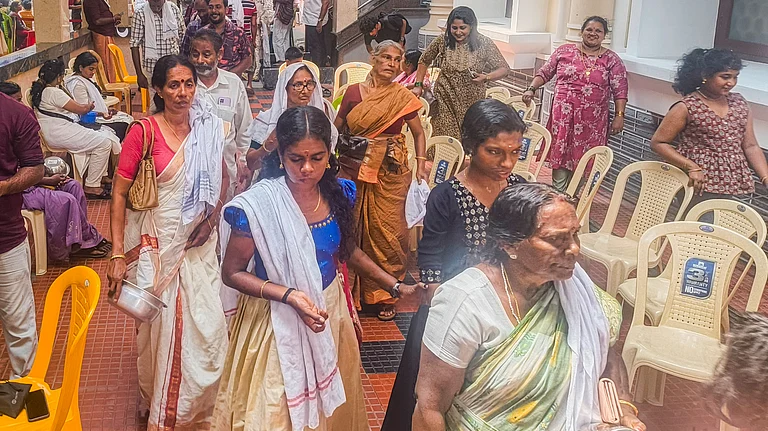The NITI Ayog has said that Indian drug regulatory standards should be on par with global standards. It has also recommended that medical devices should be overseen by a separately authority and not by the Drugs Controller General of India (DCGI).
The NITI Ayog's recommendations come during the inter-ministerial consultation on the New Drugs, Medical Devices and Cosmetics Bill, 2023. The draft bill seeks to replace the existing Drugs and Cosmetics Act of 1940. It was put up on public domain in July last year seeking feedback from stakeholders. It has been revised and sent for inter-ministerial consultation.
The NITI Ayog's recommendations also come after a string of incidents abroad that have raised questions at Indian drugs. Several deaths abroad have been linked to Indian drugs, including an ongonig bacterial infection scare in the United States. The Indian authorities also this week cracked down on dozens of drug-makers.
What has NITI Ayog said?
The NITI Aayog has recommended that Indian standards of drug regulation should be on par with global standards as well as aligned with the International Council for Harmonisation guidelines while promoting ease of doing business.
The apex public policy think tank of the central government also suggested creating a separate authority to regulate medical devices in the country which is currently being monitored by the Drugs Controller General of India (DCGI).
On clinical trials, the NITI Aayog said the draft bill should reflect the intent of overcoming the hesitancy of the Indian regulation towards global standards viz a viz adoption and alignment with ICH guidelines for clinical trials, timeliness of decisions, promoting access of new therapies/drugs at the earliest to the Indian population and ease of doing business.
Focus on the quality of drugs
In the wake of several scandals involving Indian drugs abroad, the NITI Ayog recommendations also touch drug quality.
"Adopting global standards will further boost export of drugs and assure the quality of drugs supplied domestically and globally. It will also overcome quality related issues which recently appeared in Gambia and Uzbekistan," an official source said.
India-made cough syrups were allegedly linked to children deaths in Gambia and Uzbekistan last year.
Presently, drugs and cosmetics and medical devices are regulated under the Drugs and Cosmetics Act, 1940.
The standards of quality of drugs are prescribed in the Indian Pharmacopoeia and various rules made under the Act.
"However, highly regulated countries such as the USA, Japan and EU have high standards in their regulation to ensure the quality of medical products. In general, many countries do not recognise Indian standards of drug regulations for import of drugs to their countries," the source said.
Besides, in the revised draft of the bill, the Centre has proposed that the apex regulatory body, CDSCO, will be empowered to regulate the manufacture of drugs or cosmetics, instead of state drug regulators as is the practice currently.
However, the sale of drugs, cosmetics and medical devices will continue to be regulated by the respective state governments.
NITI Aayog has endorsed the newly introduced provision of giving powers to the Central Drugs Standard Control Organisation (CDSCO) to issue manufacturing licences for drugs and cosmetics instead of state regulators, saying it will ensure uniform and effective implementation of the law and implies a huge change towards resting all manufacturing duties with the central licensing authority.
Presently, all manufacturing activities relating to drugs and cosmetics are regulated by the respective state governments through their State Drug Control Organisations. Once the proposed bill is passed by Parliament, all powers of the state governments relating to regulation of manufacture of drugs and cosmetics will go to the central government through CDSCO, the official source explained.
Further provision of taking permission to operate an e-pharmacy has been removed and replaced with "Central Government may, regulate, restrict or prohibit the sell, stocking, exhibiting or offer for sale, or distribution of any drug by online mode, by notification".
Issues with Indian drugs lately
In recent months, Indian drugs have been under the scanner for poor quality. From Central Asia to Africa, Indian drugs have been linked to adverse effects. In the United States, there have been multiple rounds of recalls.
Here we list some major incidents:
US eye drops: Last month, the US FDA found that India-based Global Pharma violated several safety norms, according to BBC. So far, Global-made eye drops have been linked to three deaths and several infections.
The Indian manufacturer of eye drops linked to three deaths and serious infections in the US violated several safety norms, the country's top regulator has said.
"The eye drops - made in India by Global Pharma and imported to the US under two brand names, EzriCare Artificial Tears and Delsam Pharma's Artificial Tears - were linked to a deadly outbreak of drug-resistant infections in the US," said the BBC report.
So far, at least 68 infections have been reported that also include eight people suffering vision loss, noted BBC.
Uzbekistan cough syrup: The Uzbek authorities in December said that 18 children died from an India-manufactured cough syrup. The syrup was made and sold by Uttar Pradesh's Noida-based Marion Biotech.
Reuters reported the Uzbek authorities as saying that they found ethylene glycol in the syrup. Ethylene glycol is a toxic substance and can cause death, according to US Centers for Disease Control and Prevention (US CDC).
In January, Marion Biotech's licence was suspended in a crackdown on irregularities in the pharma industry.
Gambia cough syrup: Indian cough syrups made by Maiden Pharmaceuticals was linked to the death of at least 70 children in Gambia last year. The authorities found that the syrups were contaminated with diethylene glycol and ethylene glycol, according to the BBC. The ethylene glycol was also found to in the medicines by Uzbek authorities.
(With PTI inputs)






















